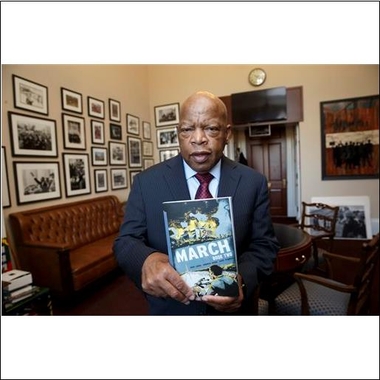'March: Book Two' shows all sides of civil rights movement

Washington (AP) — A comic book about Martin Luther King Jr. helped bring a young John Lewis into the civil rights movement.
Fifty-years later, the Georgia Democratic congressman is hoping graphic novels about his life and what his contemporaries endured to win equal civil rights for all Americans will serve as a guide for protesters as they seek justice today.
"I see some of the same manners, some of the same thinking, on the part of young people today that I witnessed as a student," said Lewis, a civil rights leader who was severely beaten in Alabama while marching for voting rights, as depicted in the movie "Selma."
"The only thing that is so different is that I don't think many of the young people have a deep understanding of the way of nonviolent direct action," he said.
"March: Book Two," the second volume in the trilogy of graphic novels chronicling Lewis' life and the civil rights movement, was released this past week. It is published by Top Shelf, co-written by Lewis staffer Andrew Aydin and illustrated by Eisner Award-winning artist Nate Powell.
Reading "March: Book Two" is like rifling through Lewis's memories of the iconic civil rights movement: The courage of the people participating in restaurant sit-ins, the fellowship of the Freedom Riders in the South, the inspiration of the speeches given by King and Lewis himself at the historic March on Washington.
"'March: Book Two' is making it plain, making it real so young children will be able to see this book —not just read it — see the drawings and feel it," said Lewis, now a longtime congressman.
Lewis hopes that the "March" trilogy has the same effect on youth as the 1957 comic book "Martin Luther King and the Montgomery Story" did for him and his contemporaries. "That little book became like a bible for us," said Lewis. Several universities and schools have already made his graphic novel required reading for students.
But the book doesn't just talk about the inspiring parts of the movement. It graphically portrays the vicious beatings marchers suffered at the hands of white Southerners, the closed-door fights between the White House and the civil rights organizations over tactics and internal clashes between organizations over strategy, necessary compromises and even homosexuality.
"You have to tell the whole truth, the good and the bad, maybe some things that are uncomfortable for some people," said Lewis, the last living member of that era's leaders of the so-called Big Six civil rights organizations.
Included in the graphic novel is the fight between those leaders — Lewis of the Student Nonviolent Coordinating Committee, King of the Southern Christian Leadership Conference, Bayard Rustin of the Congress of Racial Equality, A. Philip Randolph of the Brotherhood of Sleeping Car Porters, Whitney Young of the National Urban League and Roy Wilkins of the NAACP — over who would organize and lead the March on Washington. They wanted the porters' Randolph out front, but he insisted on Rustin, a gay black man.
Lewis noted that a lot of civil rights leaders treated the movement as if it were their personal churches, complete with male chauvinism and homophobia. But he said he, King and James Farmer of CORE agreed that Randolph should be out front, knowing that he would bring Rustin along with him. The lesson was "we must never put someone down because of the color of their skin ... and we must never put someone down because of sexual orientation," Lewis said.
President Barack Obama posthumously awarded Rustin the Presidential Medal of Freedom in 2013.
Lewis also includes in "March: Book Two" the original speech he planned to give at the March on Washington, which was censored by the other civil rights groups for its strident questioning of the government, its calling the word "patience" ''a dirty and nasty word" — an offensive view to some Catholic participants — and its plan to ask "Which side is the federal government on?"
Today, Lewis doesn't regret making changes to his speech. "I couldn't say no to A. Philip Randolph and no to Martin Luther King Jr.," Lewis said. "These two men, I loved them, I admired them, and they were my heroes."
By Jesse J. Holland, Associated Press. Copyright 2015 The Associated Press. All rights reserved. This material may not be published, broadcast, rewritten or redistributed.
The Gayly – January 26, 2015 @ 6:45am.





